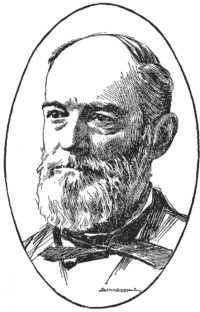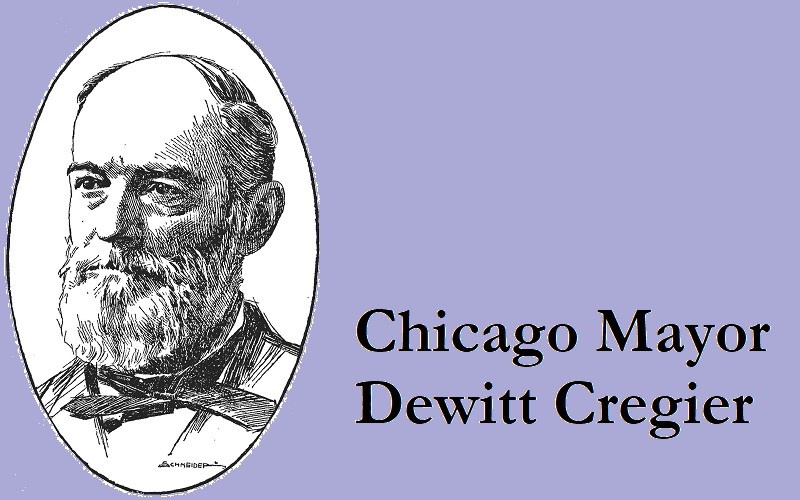DeWitt Clinton Cregier (June 1, 1829 – November 9, 1898) was Chicago’s 31st mayor–serving from 1889 to 1891–and the first of several “World’s Fair” mayors. “The New York Orphan Who Built Chicago,” Cregier got the ball rolling only a few months into his term by organizing the civic meeting to build the proposal for Chicago to host the Columbian Exposition.
The article reprinted below, from The Illustrated World’s Fair, December 1891, p. 15, describes Mayor Cregier’s role in the local agitation for a World’s Fair in Chicago.

Dewitt Clinton Cregier in 1896.
INCEPTION OF THE EXPOSITION.
As early as 1885 a resolution advocating the holding in Chicago of an international exposition to celebrate the four hundredth anniversary of the discovery of America by Columbus was presented at a meeting of the directors of the Interstate Exposition Company, and in the same year the Chicago Herald offered to donate $5,000 in support of such a project.
During the year or two following desultory mention of the matter was made in the newspapers and at meetings of the exposition company and the Commercial Club, but it was not taken up in earnest until the summer of 1889. New York papers having commenced agitation of the subject, proceeding upon the assumption that the exposition would certainly be held in that city, the Chicago press inaugurated a vigorous campaign in favor of the metropolis of the West as the proper place in which to celebrate the Columbus Quadricentennial. With remarkable unanimity of sentiment, western public men and prominent citizens took up the cudgels in behalf of Chicago, and urged that steps be taken immediately in the direction of securing the coveted prize.
At the suggestion of Mr. James W. Scott, of the Herald, Mayor Cregier brought the matter before a meeting of the city council held July 22, 1889, and a resolution was adopted requesting the mayor to appoint a committee of one hundred citizens to initiate an organization to take hold of the work. One week later the mayor named a committee of 256, and the following Thursday an enthusiastic meeting of this committee was held in the council chamber. Ringing resolutions were read, presenting reasons why Chicago should have the Fair, and an executive committee of thirty was appointed, of which Mr. Scott was a member, with power to appoint sub-committees from the general committee.
At a meeting of the executive committee, held the following day, it was decided to immediately organize a company to be known as The World’s Exposition of 1892, with a capital stock of $5,000,000. A sub-committee appointed to map out a plan of action recommended the appointment of committees, ten in number, as follows: Finance, preliminary expense, congressional action, national committee on cooperation, Illinois state committee on cooperation, press committee, addresses and local agitation, addresses, information and national agitation, railroads and transportation, and hotels and accommodations. These committees were named August 6. Monday, August 5, commodious headquarters were opened in the Adams Express building, and from that moment the energy and zeal of which Chicago itself is the best expression were exerted with the resistless force which culminated in the debate before congress and the triumphant success so well merited.
Incorporation papers were issued to the World’s Fair of 1892 August 13, and subscription books were immediately opened. The subscriptions were made payable two per cent cash and the balance in twenty per cent installments. Committees were appointed for every business, trade and profession that the city might be systematically canvassed, and the response left no doubt as to the temper of the people of Chicago relative to the Fair.
While the work of collecting subscriptions was being pushed that of agitation throughout the entire country in favor of Chicago was carried on with a vigor which captured the necessary congressional vote and resulted in the complete discomfiture of New York and St. Louis, Chicago’s principal opponents before congress.
The question of location having been settled, arrangements were made looking to permanent organization, and the first meeting of stockholders was held at Battery D* April 4, 1890. Mayor Cregier presided with James W. Scott as secretary, and a hoard of directors made up of the strongest and most representative men of the city was elected. At the second annual meeting of stockholders Mr. Scott was elected chairman, and was himself elected a director.
* The Battery D Armory stood on the lake front at Michigan Avenue and Monroe Street until 1896.

